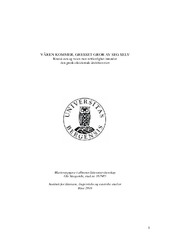| dc.contributor.author | Skogseide, Ole Johan | eng |
| dc.date.accessioned | 2011-09-09T08:07:28Z | |
| dc.date.available | 2011-09-09T08:07:28Z | |
| dc.date.issued | 2010-11-18 | eng |
| dc.date.submitted | 2010-11-18 | eng |
| dc.identifier.uri | https://hdl.handle.net/1956/5009 | |
| dc.description.abstract | Denne studien diskuterer to ulike tradisjoners oppfatninger av språkets rolle i menneskets interaksjon med omverdenen, og de samme tradisjonenes forsøk på å endre den posisjonen språket har i menneskets erfaring av verden. Det dreier seg på den ene siden om den japanske zenbuddhistiske skolen, som identifiserer språket som et grunnleggende problem ved den menneskelige persepsjonen. Innenfor denne tradisjonen blir det maktpåliggende å forlate språket for å rykke nærmere realiteten slik den foreligger uavhengig av det menneskelige blikket. På den andre siden vil Jacques Derridas oppfatning av det samme problemområdet bli diskutert. Den mest markante forskjellen mellom disse to måtene å behandle språk og erfaring på, er sistnevntes overbevisning om at det ikke er mulig å foreta et sprang ut av språket i retning av det som innenfor zenbuddhismen beskrives som realiteten. | en_US |
| dc.description.abstract | This study in literary theory touches on a philosophical area of inquiry: the relationship between a human observer and the observed, be it a thing or another human being. The two different traditions that will come under discussion in order to shed light on this problem, both identify language as a barrier put between human perception and the reality of the percieved. Within Zen Buddhism, more specifically the Rinzai school of Japanese Zen Buddhism, the goal is to rid the mind of its habitual lingual perception of the reality, as it is provisionally named within this tradition. Jacques Derrida discusses the ability of the human perception to do the same, i.e. to rid itself of language and to see the thing as it is in and of itself (das Ding an sich). Ultimately, this will be shown to be an ethical problem, as other human beings are regarded much in the same way as things are before the human gaze. The material used will be short narrative texts from the Rinzai tradition, and the study will discuss the possibility or impossibility of the human mind to see its surroundings unhindered by the intermediary of language. Poetry as a genre will play a role in this discussion, as poetry is identified in the writings of Derrida as the particular mode of language which lets the other appear as other. Furthermore, poetry is a key part of the Rinzai tradition, wherein this genre is used as a means to directly point out the reality to the student of Zen. | en_US |
| dc.format.extent | 487822 bytes | eng |
| dc.format.mimetype | application/pdf | eng |
| dc.language.iso | nob | eng |
| dc.publisher | The University of Bergen | eng |
| dc.title | Våren kommer, gresset gror av seg selv. Rinzai-zen og veien mot rettferdighet innenfor den gresk-oksidentale åndshistorien | eng |
| dc.type | Master thesis | |
| dc.description.degree | Master i Allmenn litteraturvitenskap | |
| dc.description.localcode | MAHF-LITT | |
| dc.description.localcode | ALLV350 | |
| dc.subject.nus | 712103 | eng |
| dc.subject.nsi | VDP::Humanities: 000::Literary disciplines: 040::General literary science: 041 | |
| fs.subjectcode | ALLV350 | |
